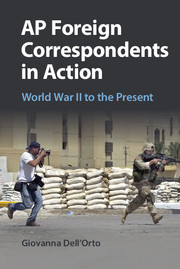Book contents
- Frontmatter
- Dedication
- Contents
- List of Figures
- Acknowledgments
- 1 Introduction
- 2 Getting Ready, Getting Started, and Getting Lost in Translation
- 3 What's the Story? News Judgment, News Pitches
- 4 Getting to the Sources (and Keeping Them Alive)
- 5 Being an American Abroad – Perceptions of Journalists
- 6 Eyewitness Reporting: Getting to the Scene
- 7 The Costs of Being There to Count the Bodies
- 8 Your Byline Today, Mine Tomorrow: Teamwork and Competition
- 9 Access, Censorship, and Spin: Relating with Foreign Governments
- 10 Flacks, Spooks, GIs, and Objective Journalists: Relating with the U.S. Government Abroad
- 11 Getting It Out, Getting It Edited: Filing News, Working with the Desk
- 12 The Evolving Milkmen: Writing for an Audience
- 13 Purpose and Influence of Foreign Correspondence
- 14 Eight Decades of Bearing Witness and Telling the World's Stories: Conclusions
- Bibliography
- Index
8 - Your Byline Today, Mine Tomorrow: Teamwork and Competition
Published online by Cambridge University Press: 05 November 2015
- Frontmatter
- Dedication
- Contents
- List of Figures
- Acknowledgments
- 1 Introduction
- 2 Getting Ready, Getting Started, and Getting Lost in Translation
- 3 What's the Story? News Judgment, News Pitches
- 4 Getting to the Sources (and Keeping Them Alive)
- 5 Being an American Abroad – Perceptions of Journalists
- 6 Eyewitness Reporting: Getting to the Scene
- 7 The Costs of Being There to Count the Bodies
- 8 Your Byline Today, Mine Tomorrow: Teamwork and Competition
- 9 Access, Censorship, and Spin: Relating with Foreign Governments
- 10 Flacks, Spooks, GIs, and Objective Journalists: Relating with the U.S. Government Abroad
- 11 Getting It Out, Getting It Edited: Filing News, Working with the Desk
- 12 The Evolving Milkmen: Writing for an Audience
- 13 Purpose and Influence of Foreign Correspondence
- 14 Eight Decades of Bearing Witness and Telling the World's Stories: Conclusions
- Bibliography
- Index
Summary
Far from lone wolves, correspondents most often worked in teams, developing their closest ties with fellow APers, but also across the competition. Few examples illustrate the critical importance, and heartbreaking closeness, of this spirit better than what Tony Smith (10–12) faced with the handful of foreign journalists who had gone into Sarajevo as the siege began in 1992: AP photographers Santiago Lyon and David Brauchli, North Star photographer Peter Northall, and Jordi Pujol and Eric Hauck of the Catalan newspaper Avui. They had devised the strategy of splitting into pairs, each doing 90-minute patrols in different parts of the violent city to minimize risk and maximize newsgathering. One morning, Brauchli and Pujol did not come back. The two remaining pairs went out to mount a search and, after locals said they had seen them go up a road before a shell attack, tried calling the hospital. Getting no answer, they went there – and found Brauchli having shrapnel removed from half his body, without anesthesia, while 26-year-old Pujol, who had not been wearing a flak vest, had been killed on the spot.
“It was strange, really, because the coverage goes on, but you don't really notice it in a way,” Smith recalled. In the next few “surreal” days, in addition to continuing to cover the news, Smith not only found someone to make a coffin (a high-demand but essential item, since with no electricity “it was all a little bit stinky”) and bought a car with enough gas, but also waited for the doctors’ okay that Brauchli, with no painkillers, could “risk” the trip out, and tried to arrange some transportation protection from international officials. After “breaking down” in the office – thinking “I can't do this … the goal post keeps moving, and it's not really, it's not fair” – Smith decided there was “no point in relying on the kindness of the UN because they couldn't find their arsehole with two hands and a roadmap.” So the journalists made their own plan out of Sarajevo aiming for Split, about 100 miles away or a 12-hour drive then, with the “catatonic” Brauchli in the reclined seat of the “injured Toyota Corolla”:
[W]e raced along the sniper alley.
- Type
- Chapter
- Information
- AP Foreign Correspondents in ActionWorld War II to the Present, pp. 216 - 236Publisher: Cambridge University PressPrint publication year: 2015



